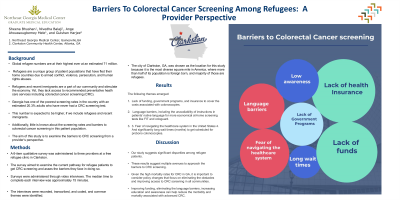Tuesday Poster Session
Category: Colorectal Cancer Prevention
P3814 - Barriers to Colorectal Cancer Screening Among Refugees: A Provider Perspective
Tuesday, October 29, 2024
10:30 AM - 4:00 PM ET
Location: Exhibit Hall E

Has Audio
- SB
Sheena Bhushan, MD
Northeast Georgia Medical Center
Buford, GA
Presenting Author(s)
Sheena Bhushan, MD1, Nivedha Balaji, MD2, Ange Ahoussougbemey Mele, MD2, Gulshan Harjee, MD3
1Northeast Georgia Medical Center, Buford, GA; 2Northeast Georgia Medical Center, Gainesville, GA; 3Clarkston Community Health Center, Atlanta, GA
Introduction: Global refugee numbers are at their highest ever at an estimated 71 million. Refugees are a unique group of patient populations that have fled their home countries due to armed conflict, violence, persecution, and human rights abuses. Refugees and recent immigrants are a part of our community and stimulate the economy. Yet, they lack access to recommended preventative heath care services including colorectal cancer screening (CRC). Georgia has one of the poorest screening rates in the country with an estimated 20.3% adults who have never had a CRC screening test. This number is expected to be higher, if we include refugees and recent immigrants. Additionally, little is known about the screening rates and barriers to colorectal cancer screening in this patient population. The aim of this study is to examine the barriers to CRC screening from a provider’s perspective.
Methods: A 6-item qualitative survey was administered to three providers at a free refugee clinic in Clarkston. The survey aimed to examine the current pathway for refugee patients to get CRC screening and asses the barriers they face in doing so. Surveys were administered through video interviews. The median time to complete each interview was approximately 15 minutes. The interviews were recorded, transcribed, and coded, and common themes were identified. The city of Clarkston, GA, was chosen as the location for this study because it is the most diverse square mile in America, where more than half of its population is foreign born, and majority of those are refugees.
Results: The following themes emerged: 1. Lack of funding, government programs, and insurance to cover the costs associated with colonoscopies. 2. Language barriers, including the unavailability of instructions in patients’ native language for more economical at-home screening tests like FIT and cologuard. 3. Fear of navigating the healthcare system in the United States 4. And significantly long wait times (months) to get scheduled for probono colonoscopies.
Discussion: Our study suggests significant disparities among refugee patients. These results suggest multiple avenues to approach the barriers to CRC screening. Given the high mortality rates for CRC in GA, it is important to consider policy changes that focus on eliminating the obstacles and improving access to CRC screening in all communities. Improving funding, eliminating the language barriers, increasing education and awareness can help reduce the morbidity and mortality associated with advanced CRC.
Disclosures:
Sheena Bhushan, MD1, Nivedha Balaji, MD2, Ange Ahoussougbemey Mele, MD2, Gulshan Harjee, MD3. P3814 - Barriers to Colorectal Cancer Screening Among Refugees: A Provider Perspective, ACG 2024 Annual Scientific Meeting Abstracts. Philadelphia, PA: American College of Gastroenterology.
1Northeast Georgia Medical Center, Buford, GA; 2Northeast Georgia Medical Center, Gainesville, GA; 3Clarkston Community Health Center, Atlanta, GA
Introduction: Global refugee numbers are at their highest ever at an estimated 71 million. Refugees are a unique group of patient populations that have fled their home countries due to armed conflict, violence, persecution, and human rights abuses. Refugees and recent immigrants are a part of our community and stimulate the economy. Yet, they lack access to recommended preventative heath care services including colorectal cancer screening (CRC). Georgia has one of the poorest screening rates in the country with an estimated 20.3% adults who have never had a CRC screening test. This number is expected to be higher, if we include refugees and recent immigrants. Additionally, little is known about the screening rates and barriers to colorectal cancer screening in this patient population. The aim of this study is to examine the barriers to CRC screening from a provider’s perspective.
Methods: A 6-item qualitative survey was administered to three providers at a free refugee clinic in Clarkston. The survey aimed to examine the current pathway for refugee patients to get CRC screening and asses the barriers they face in doing so. Surveys were administered through video interviews. The median time to complete each interview was approximately 15 minutes. The interviews were recorded, transcribed, and coded, and common themes were identified. The city of Clarkston, GA, was chosen as the location for this study because it is the most diverse square mile in America, where more than half of its population is foreign born, and majority of those are refugees.
Results: The following themes emerged: 1. Lack of funding, government programs, and insurance to cover the costs associated with colonoscopies. 2. Language barriers, including the unavailability of instructions in patients’ native language for more economical at-home screening tests like FIT and cologuard. 3. Fear of navigating the healthcare system in the United States 4. And significantly long wait times (months) to get scheduled for probono colonoscopies.
Discussion: Our study suggests significant disparities among refugee patients. These results suggest multiple avenues to approach the barriers to CRC screening. Given the high mortality rates for CRC in GA, it is important to consider policy changes that focus on eliminating the obstacles and improving access to CRC screening in all communities. Improving funding, eliminating the language barriers, increasing education and awareness can help reduce the morbidity and mortality associated with advanced CRC.
Disclosures:
Sheena Bhushan indicated no relevant financial relationships.
Nivedha Balaji indicated no relevant financial relationships.
Ange Ahoussougbemey Mele indicated no relevant financial relationships.
Gulshan Harjee indicated no relevant financial relationships.
Sheena Bhushan, MD1, Nivedha Balaji, MD2, Ange Ahoussougbemey Mele, MD2, Gulshan Harjee, MD3. P3814 - Barriers to Colorectal Cancer Screening Among Refugees: A Provider Perspective, ACG 2024 Annual Scientific Meeting Abstracts. Philadelphia, PA: American College of Gastroenterology.
